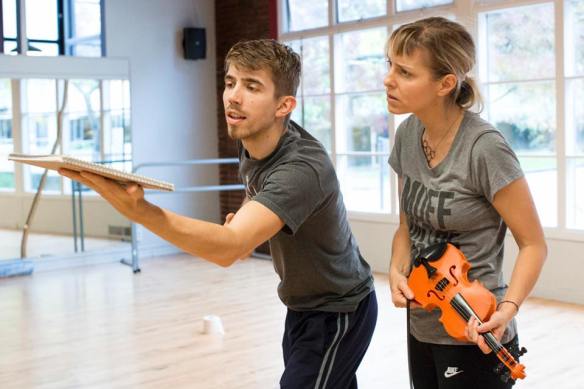

Second Inversion and the Live Music Project create a monthly calendar featuring contemporary classical, cross-genre, and experimental performances in Seattle, the Eastside, Tacoma, and places in between!
Keep an eye out for our flyer in concert programs and coffee shops around town. Feel free to download, print, and distribute it yourself! If you’d like to be included on this list, submit your event to the Live Music Project at least 6 weeks prior to the event and tag it with “new music.”
October 2018 New Music Flyer
Wayward Music Series
Concerts of contemporary composition, free improvisation, electroacoustic music, and sonic experiments. This month: atmospheric soundscapes, improvised noise, music inspired by historic women of Mexico, and more.
Various days, 7:30/8pm, Good Shepherd Chapel | $5-$15
Max Richter and ACME
There are few places more appropriate for the rainy day soundscapes of Max Richter than Seattle. Hear the prolific composer with the American Contemporary Music Ensemble as they perform Infra in its entirety, plus selections from The Blue Notebooks. Check out our interview with the composer for more details on what’s in store.
Tues, 10/2, 7:30pm, Moore Theatre | $35-$45

Photo by Wolfgang Borrs.
 Leslie Odom, Jr. with the Seattle Symphony
Leslie Odom, Jr. with the Seattle Symphony
Leslie Odom, Jr. launched into stardom when he originated the role of Aaron Burr in a little musical called Hamilton. Now he joins our own Seattle Symphony for an evening of jazz standards and Broadway hits.
Tues-Wed, 10/2-10/3, 7:30pm, Benaroya Hall | $46-$103
SMCO: American Experiences
It’s rare to see the concertmaster of PNB on the same program as the rapper from Macklemore’s “Thrift Shop”—but then again, Seattle Metropolitan Chamber Orchestra’s 10th anniversary is cause for boundary-bursting celebration. Michael Jinsoo Lim joins the orchestra for Samuel Barber’s Violin Concerto, Wanz performs Randall Woolf’s Blues for Black Hoodies, and masterworks by Leonard Bernstein and Jennifer Higdon complete the program.
Thurs, 10/4, 7:30pm, Nordstrom Recital Hall | $15-25

Wanz guest stars in SMCO’s Tenth Anniversary concert.
The Esoterics: CŌNSŌLŌ
Requiems are reimagined in this concert exploring the sense of comfort found in the musical act of remembrance. Included in the program are new works from the three winners of last year’s POLYPHONOS competition: Anna-Karin Klockar, Sarah Rimkus, and Ily Matthew Maniano.
Fri, 10/5, 8pm, St. Stephen’s Episcopal Church | $15-$25
Sat, 10/6, 8pm, Holy Rosary Catholic Church | $15-$25
OSSCS: The Bounty of the Earth
Orchestra Seattle and Seattle Chamber Singers launch a season-long celebration of the music of Lili Boulanger, performing her extraordinary setting of Psalm 24 (“The Earth Belongs to the Eternal One”). Also on the program is Aaron Copland’s Appalachian Spring, Haydn’s The Seasons, and a composition by the OSSCS’s new conductor, William White.
Sat, 10/6, 7:30pm, First Free Methodist Church | $10-$25
Earshot Jazz Festival: Amy Denio
Vocalist and multi-instrumentalist Amy Denio brings her inimitable brand of politically-charged avant-jazz to Earshot, performing compositions and improvisations that color her four-octave vocal range with electronics.
Wed, 10/10, 8pm, Good Shepherd Chapel | $10-$18
Kin of the Moon & Karin Stevens Dance: lily/LUNG
Kaley Lane Eaton’s 30-minute electroacoustic composition LUNG receives its world premiere by musicians from Kin of the Moon and Strange Interlude, with choreographed dance by Karin Stevens and Amelia Love Clearheart. Also on the program is Eaton’s chamber opera lily [bloom in my darkness], which tells the story of Eaton’s great-grandmother, an orphan who fled England at the start of WWI.
Thurs-Sat, 10/11-10/13, 8pm, Erickson Theatre | $20-$50
Sun, 10/14, 11am, Erickson Theatre | $20-$50

Photo by Michelle Smith-Lewis.
Samantha Boshnack: Seismic Belt
Seattle-based trumpeter and bandleader Samantha Boshnack takes listeners on a sonic adventure into the Ring of Fire in Seismic Belt, her latest large-scale work scored for seven-piece band.
Fri, 10/12, 7:30pm, The Royal Room | $10-$20
Seattle Symphony: [untitled] 1
Enter the sparse and haunting sound world of Danish composer Hans Abrahamsen’s Schnee (“Snow”), an immersive, hour-long chamber work filled with ghostly canons and crystalline frost. Fellow Dane Thomas Dausgaard conducts.
Fri, 10/12, 10pm, Benaroya Hall | $16
ROCCA: Enescu, Bartók, Prokofiev
Romanian American Chamber Concerts and Arts presents an afternoon of scintillating masterpieces by George Enescu, Béla Bartók, Gabriela Lena Frank, and Sergei Prokofiev.
Sat, 10/13, 3pm, Nordstrom Recital Hall | $26
Music of Today: Mivos Quartet
The New York-based Mivos Quartet travels to Seattle for a performance of music by University of Washington School of Music faculty composers Huck Hodge, Joël-François Durand, and more.
Tues, 10/23, 7:30pm, Meany Theater | $10-$15

Jesse Myers & Leanna Keith: Lizée’s Hitchcock & Tarantino Etudes
Cult classic fans rejoice: pianist Jesse Myers and flutist Leanna Keith present two of Nicole Lizée’s etudes for glitch film. In her Hitchcock Etudes, the composer glitches and stitches together live piano music with scenes from Psycho, The Birds, Rope, and The Man Who Knew Too Much. For her Tarantino Etudes, a virtuosic bass flute solo flutters between scenes from Reservoir Dogs, Pulp Fiction, and Kill Bill.
Fri, 10/26, 8pm, Good Shepherd Chapel | $5-$15
Earshot Jazz Festival: Allos Musica
Classical, jazz, and Middle Eastern musical strands are woven together in this improvising ensemble of clarinet, launeddas, accordion, oud, harmonium, and percussion.
Thurs, 10/25, 7pm & 9:30pm, The Royal Room | $10-$22
Emerging Artist: Joep Beving
Lose yourself in the delicate, melancholic melodies of Dutch advertising-executive-turned-composer Joep Beving in this solo concert of intimate piano music.
Fri, 10/26, 8pm, Nordstrom Recital Hall | $25-$30

Emerald City Music: Café Music
Be whisked away to the warmth of a quiet café in this program of 20th-century French Impressionist and American composers, including music by Jean Françaix, Francis Poulenc, Darius Milhaud, Camille Saint-Saëns, and Paul Schoenfield.
Fri, 10/26, 8pm, 415 Westlake | $45
Sat, 10/27, 7:30pm, The Minnaert Center (Olympia) | $25-$45




 Leanna Keith (LK):
Leanna Keith (LK): HB:
HB:  KS:
KS: KLE:
KLE:





 Karin Stevens:
Karin Stevens: 
